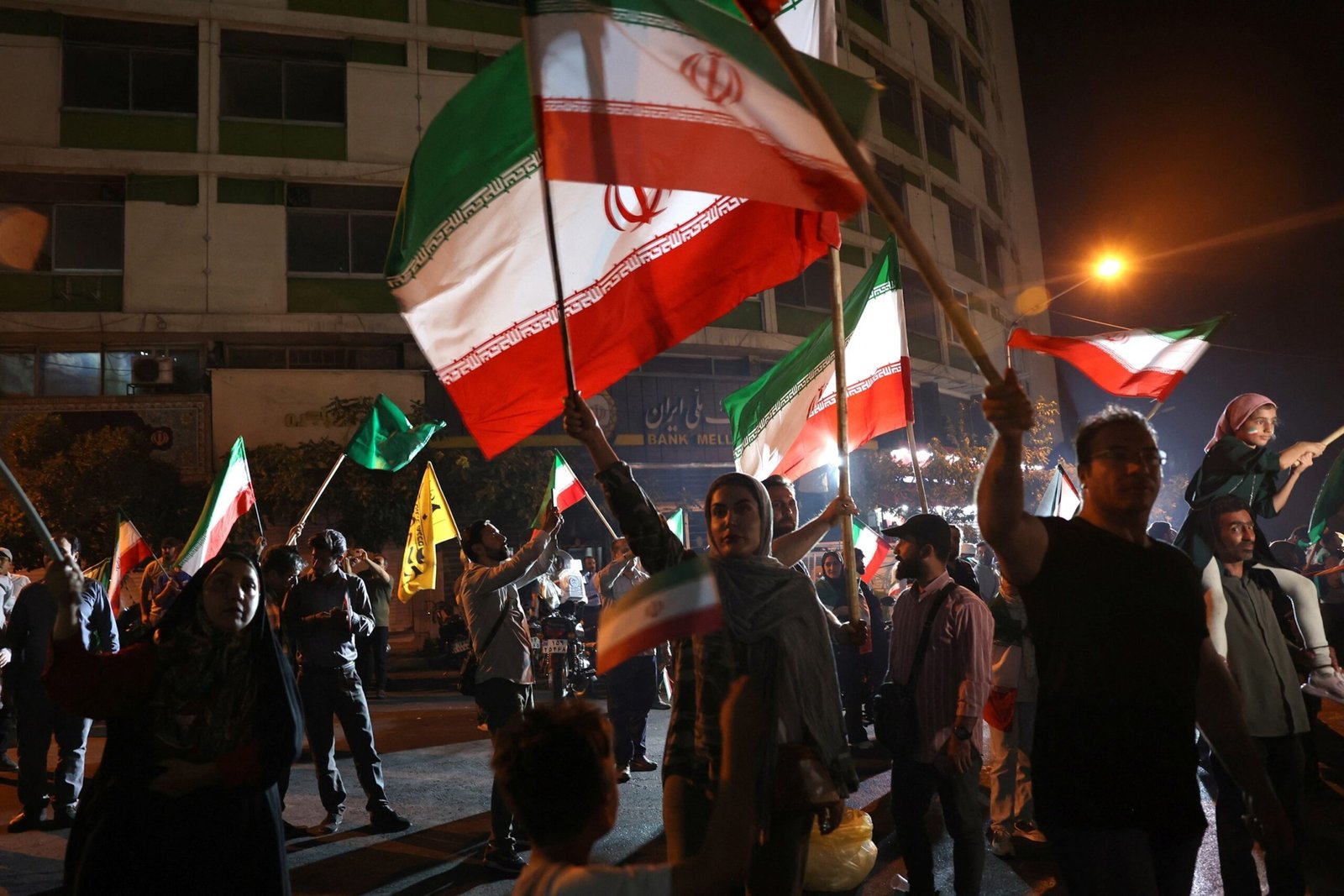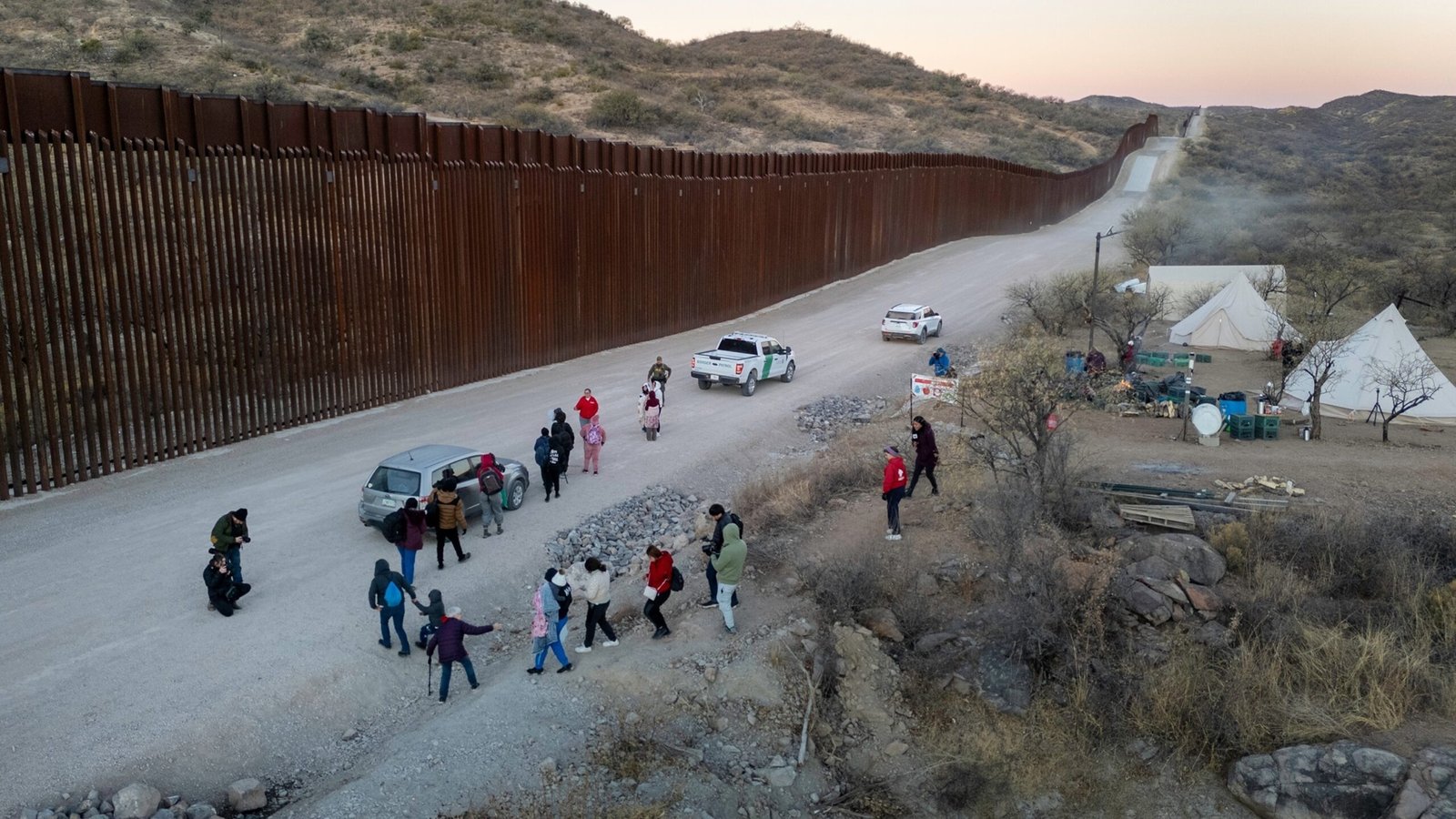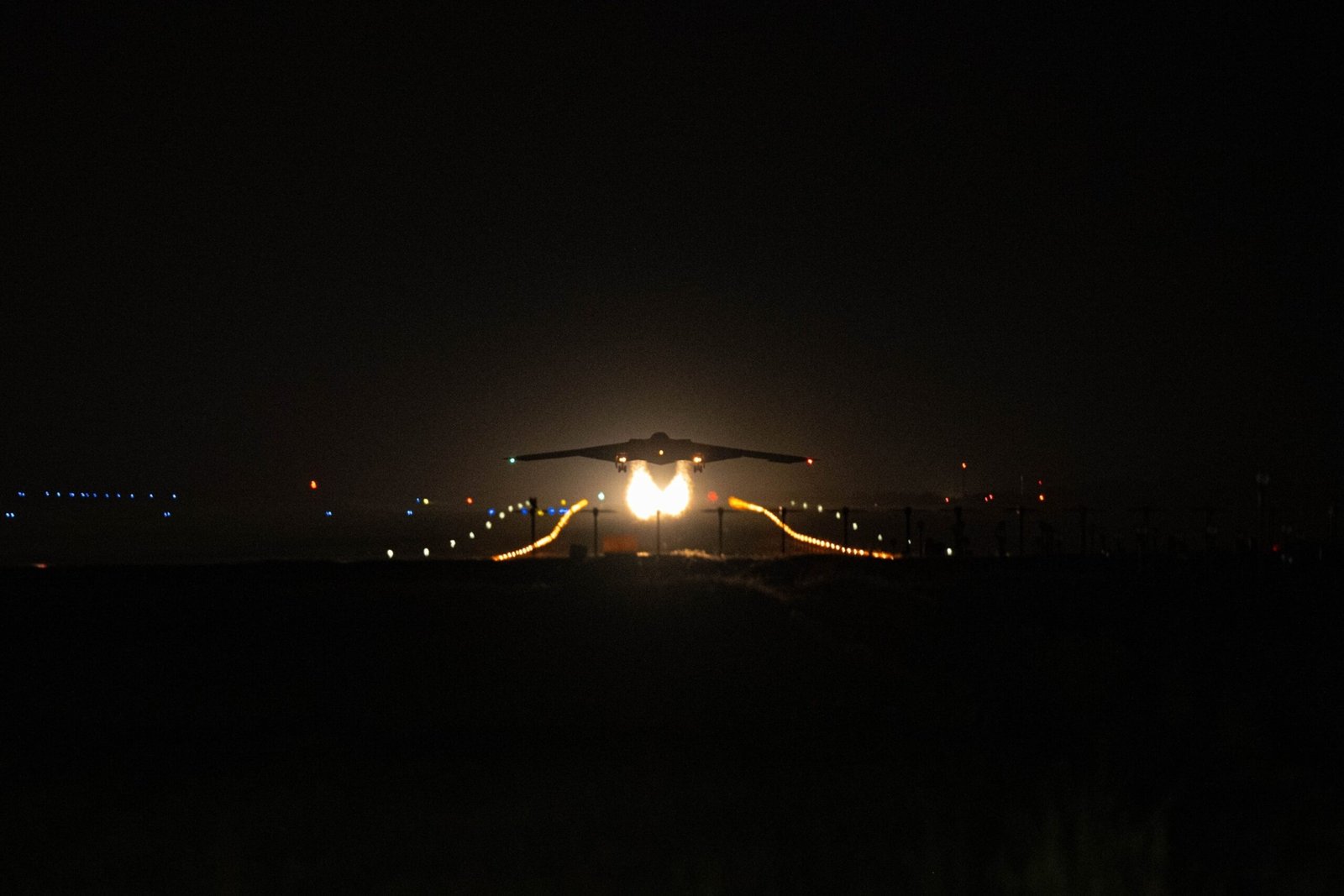Almost two weeks after the United States and Israel attacked Iran’s nuclear facilities, it is not clear how much reverse treated the country’s ambitions to obtain the final weapon.
Some nuclear proliferation experts told ABC News who believe that strikes could lead to a “fork on the road” that results in Tehran taking a more dangerous and secret path to obtain nuclear weapons if you choose to do it.
On Wednesday, Iranian President Masoud Peeshkian signed a bill approved last week by the Parliament of Iran to stop cooperation with the International Atomic Energy Agency (OIEA), the United Nations Nuclear Control Agency. The powerful Guardian Council of 12 members of Iran, half of whom is appointed by Iran’s Supreme Leader, Ayatollah Ali Khamenei, has also signed the bill.

A group of Iranian wave flags after Iran’s attack in the US military base in Qatar, in the middle of the conflict in Iran-Israel, in Tehran, Iran, June 23, 2025.
Majid Asgaripour / Wana through Reuters
“This suspension will remain in force until certain conditions are met, including guaranteed security of nuclear and scientific facilities,” Iran’s state television reported, citing the bill.
Meanwhile, Iran is not allowing that there is no external body in the country to verify the status of its nuclear program, leaving the country to rebuild its nuclear infrastructure practically secret.
The State Department described the “unacceptable” measure, saying that Iran “has a window of opportunity to reverse the course and choose a path of peace and prosperity,” spokesman Tammy Bruce said Wednesday.
Israeli Foreign Minister Gideon Sa’ar criticized Iran’s decision as “scandalous”, saying in a publication on social networks, “this is a complete resignation of all his [Iran’s] International nuclear obligations and commitments. “
“The international community must act decisively now and use all means at its disposal to stop Iranian nuclear ambitions,” said Sa’ar.
Some nuclear weapons experts said they are concerned that the movement can also lead Iran to withdraw from the non -proliferation of the non -proliferation of the 57 -year -old Nuclear Arms Treaty (NPT).
“The last country to retire from the NPT was North Korea,” News Howard Stoffer, a professor of international affairs at New Haven University and former Deputy Executive Director of the Terrorism Committee of the UN Security Council, told ABC.

Iranian President Masoud Peeshkian, in the photo earlier this year in Moscow, approved a bill, on July 2, 2025, suspending cooperation with the International Atomic Energy Agency, the United Nations Nuclear Control Agency.
Getty images
Iran is still evaluating if it will remain in the TNP, Iranian Foreign Minister Abbas Araghchi said on Iranian state television after Parliament’s vote last week. The TNP also requires IEA inspections to verify compliance with the treaty, so it is not clear how Iran will fulfill this aspect of the treaty, given the new law.
According to Araghchi, who added that Iran “will act with the country’s interest.”
The TNP, signed by 191 countries in 1968, said that countries, in addition to certificates as nuclear powers, cannot develop nuclear weapons.
However, the NPT allows countries to search for peaceful civil nuclear programs, such as energy use.
“They can go directly to the edge, and basically do everything, except to assemble the weapons in its final form and continue to agree technically with the treaty. That scares many countries that are neighbors of Iran, Israel in particular,” John Erath, director of the main policy of the Center for Weapons and not proliferation, told ABC News.
In 2015, Iran and several world powers, including the United States, signed Iran’s civil nuclear program that limited Iran’s civil nuclear program for peaceful purposes in exchange for lifting the economic sanctions imposed on the country. In 2018, President Donald Trump retired from the agreement, describing him as “defective for his nucleus” and reimputed the US sanctions.
Trump’s withdrawal from JCPOA was the beginning of a series of events prior to the 12 -day war in June. When Trump returned to office in January, negotiating a new nuclear agreement with Iran was one of the elements at the top of his foreign policy agenda.
After several rounds of conversations between the United States and Iran that ended without agreement, along with the growing tensions between Israel and Iran, the terrorism actors sponsored in the region, Israel finally decided to attack directly on June 13, which led to the 12 -day war.
The United States decided to join Israel’s military campaign against Iran on June 21 with specific air attacks in Iran’s nuclear facilities.
Now that the dust has settled, Israel calls the European nations that are still part of the Obama era to reimpose the UN sanctions against Iran.

President of the Chiefs of Joint Staff, the General of the Air Force, Dan Caine, appears during a press conference in the Pentagon on June 26, 2025 in Arlington, Virginia.
Andrew Harnik/Getty Images
Erath said that if Iran retired from the TNP, he would send a dangerous signal to the world.
“It is pointed out that the acquisition of nuclear weapons is taken seriously. It would be serious and attract the attention of many people,” Erath told ABC News. “Until now, they have avoided doing it because it is an international standard that is very important for many people around the world.”
Erath added: “They [Iran] They do not want to put in a category with North Korea as a state that retired from the TNP and is presented as an international outcast. “
‘Bifurcation moment’
Without the OIEA, Iran is allowed to evaluate the damage caused to the country’s three nuclear facilities, it has been difficult to determine precisely the scope of the damage caused in the June 21 attack ordered by Trump in Iran’s nuclear facilities in Fordo, Natanz and Isfahan.
Iran retaliates on June 23 shooting missiles at the United States Air Base in Qatar. American officials said the missiles were intercepted with the help of Qatar and that they were not injured from the attack.
It is not clear the scope of the damage caused to Iran’s nuclear program by Israel’s military campaign. Israel killed several of Iran’s best nuclear scientists during the 12 -day war, along with specific attacks in Iran’s nuclear facilities. The extent to which this combined military action goes back Iran’s nuclear program is unknown at this time.
Trump and Defense Secretary Pete Hegseth have said that the United States attack “deleted” Iran’s nuclear program and delayed it for years.

President Donald Trump meets with Israeli Prime Minister Benjamin Netanyahu at the Oval Office of the White House in Washington, on April 7, 2025.
Kevin Mohatt/Reuters, files
An evaluation of preliminary damages filtered classified produced by the Defense Intelligence Agency with the help of the United States Central Command indicated that the United States strikes did not completely destroy Iran’s nuclear program, but probably delayed it for months.
At a press conference last week, Hegseth told reporters that the report had not been coordinated with the intelligence community and that their findings were labeled as “little confidence.” He told reporters that “new intelligence” estimated that Iran’s program had been demolished for years, not months.
Esmaeil Baghaei, spokesman for the Iranian Ministry of Foreign Affairs, is the only official of the Iranian government who says that the bombing “severely damaged” nuclear facilities.
“Whatever they are accommodated, I am not interested because, whatever the degree of damage, they can rebuild. It is a matter of time, longer or longer, but they can rebuild. If they are rebuilt without the monitoring of the OIEA, how will the world know something?” Erath said. “What they are pointing out is that they will be more dangerous next time. It really puts us in a kind of bifurcation on the road.”
Stoffer said that there is a “trusted deficit” between Iran and the Oiea because they will blame the Oiea and its director, Rafael Grossi, for giving Israel the final pretext to start a war with Iran when providing what calls a false report on Iran’s nuclear program.
“They felt that it was an accomplice of the attacks that led to the destruction or damage of the Iranian facilities,” Stoffer said.
Grossi has rejected Iran’s accusations, saying in An interview With Al Jazeera on June 19, two days before the United States strike at Iran’s nuclear facilities, “to pretend that an OIEA report in any way is a green light or a facilitator of an attack is absolutely absurd.”
“In this report, we said very clear and very objectively that Iran was not informing the Oiea about several things, which are very, very important, and we were not obtaining the transparency we needed for that,” Grossi said. “And at the same time, we said very clearly in that report that preceded these dramatic events and the attack, which we do not find in the elements of Iran that indicate that there is an active and systematic plan to build a nuclear weapon.”
Iran also criticized the OIEA and Grossi directly, for not condemning the United States and Israel for attacking their nuclear facilities, which they would consider a violation of international law.
In May, the OIEA censored Iran, claiming that the country had stored enriched uranium at close levels of 90%weapons.
“They came to the conclusion that Iran was moving physable material from a place where they can inspect it, and was highly enriched at 87%, another place they had never seen before,” Stofer said, describing the series of events that caused the first censorship of the OIEA in 20 years.

The supreme leader of Iran of the Islamic Republic, Ayatolá Ali Khamenei addresses the nation, on June 26, 2025.
Irib/AFP news agency through Getty Images
After the OIEA report, Israel launched its attack against Iran on June 13, killing senior Iranian security officials and nuclear scientists, and establishing the basis for the US bombing of Iran’s nuclear facilities.
Are there possible negotiations?
Sunday, French president Emmanuel Macron said in a message Published in the Social Network Platform X that had spoken on the phone to Pezeshkian and urged him to return to the negotiating table and make an agreement to allow the OIEA to resume the inspections of its nuclear program.
“Iran’s nuclear program is a serious concern and must be resolved through negotiation,” Macron said in the position. “Therefore, I invited President Pezeshkian to quickly return to the negotiating table to reach an agreement, the only viable path for decallation.”
Erath said that, in the absence of negotiations, Israel and the United States could opt for a military solution again if they will repair their nuclear abilities.
“As a professional diplomat, I would prefer a diplomatic solution,” Erath said. “But that will be much more difficult to achieve next time, and there will be next time.”





